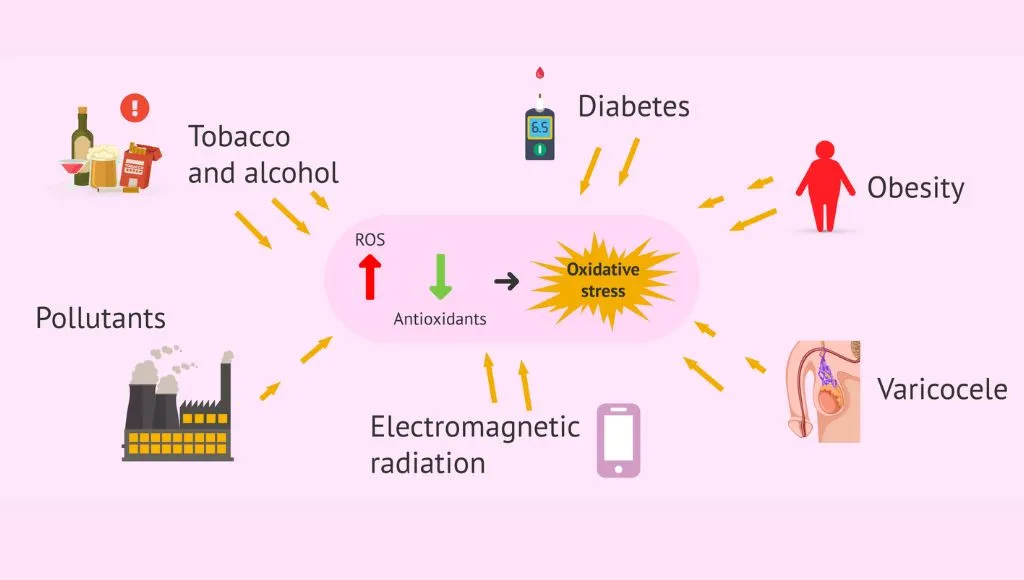Oxidative stress has become a widespread problem. It happens when free radicals outnumber antioxidants in our bodies. This imbalance can damage cellular, contributing to aging and other diseases.
Regardless, it is possible to prevent and manage it through simple lifestyle adjustments. This article explores tactical strategies for oxidative stress, focusing on everyday actions that promote better health and longevity.
Causes of Oxidative Stress And Their Effects
Oxidative stress is caused by too many free radicals – unstable molecules that can damage cells. This process is normal, but some life practices and environmental conditions can accelerate and worsen it.

Several factors cause oxidative stress. Understanding these factors is key to managing this stress. They are:
- Environmental pollution: Polluted air from cars and factories increases free radicals in our bodies.
- Unhealthy Eating Habits: Diets rich in processed foods and low in antioxidants can lead to free radical build.
- Exposure to Radiation: Sun exposure and medical scans can increase free radical levels.
- Smoking: Smoking floods the body with free radicals, causing cellular damage.
- Excessive Alcohol Consumption: Regular heavy drinking disrupts the balance of free radicals and antioxidants.
- Stressful Lifestyle: High stress can trigger an increase in free radicals.
- Lack of Sleep: Not getting enough sleep hampers the body’s ability to manage free radicals.
- Medications: Some medicines can increase free radical production as a side effect.
Oxidative Stress can lead to the following:
- Various diseases
- Quick Aging
- Swelling and Inflammation
- Male fertility problems
ALSO READ: Oxidative Damage: Its Impact, Sources And Prevention
Preventive Strategies
- Including Antioxidants In Your Diet: Consuming foods rich in antioxidants is key. Fruits like berries and oranges, vegetables such as carrots and bell peppers, and nuts and seeds are excellent chives. These foods neutralize harmful free radicals.
- Balanced Physical Activity: Regular exercise increases antioxidant levels but avoids intense exercise. Activities like jogging and yoga are beneficial, yet listen to your body and maintain a balance. Exercise is beneficial for overall health.
- Effective Stress Management: Chronic stress leads to oxidative stress. Techniques like meditation, deep breathing, and mindfulness can reduce stress levels. They can help free radicals and antioxidants. Spending time with family and friends can also help in stress reduction.
- Prioritizing Sleep: Good sleep is crucial for dealing with oxidative stress and helps the body rear itself. Aim for 7-9 hours of quality sleep each night.
- Reducing Toxins: Minimizing exposure to pollutants and harmful chemicals is essential. Smoking and excessive alcohol can increase oxidative stress. So, avoid smoking and excessive alcohol consumption to manage oxidative stress.
- Regular Health Screenings: Frequent health checkups can detect early signs of oxidative stress. This allows timely intervention and lifestyle adjustments. Keep checking on your healthcare provider to avoid any further complications.
- Stay Hydrated: Drinking enough water is essential for reducing oxidative stress. It aids in detoxification and helps maintain cellular health.
- Choosing Healthy Cooking Methods: Opt for cooking methods like steaming or baking over frying. It reserves the nutritional values of food and helps maintain its antioxidant properties.
- Supplementing Wisely: Sometimes, these lifestyles do not help, so consider supplements to boost antioxidant intake. Omega-3 fatty acids, Zinc, vitamin C, and green tea extract are rich in antioxidant properties. You should consult a healthcare professional before taking supplements, as they can guide you according to your needs.
Additional Lifestyle Changes
- Environmental Awareness: Be aware of your environment. Reducing exposure to air and water pollutants can significantly decrease oxidative stress.
- Healthy Body Weight: It is crucial to keep the right body weight. Too much weight and obesity can increase it, and losing weight by proper dieting and exercising is good for your body.
- Limit Alcohol and Caffeine Consumption: Reducing alcohol and caffeine can help. Both can increase oxidative stress when consumed in excess. Try to avoid and find other better alternatives to alcohol and caffeine.
- Skincare and Sun protection: protecting your skin from excessive sun exposure is crucial. UV rays can increase free radicals, so wear sunscreen and sun protection clothes. Also, limit your sun exposure.
Lastly, various factors cause oxidative stress. But it can be prevented through a good diet, exercise, stress management, and enough sleep. Limiting exposure to sun and radiation is also very necessary. Remember to stay hydrated, eat the right food, and visit your healthcare professional for regular checkups. You can make these effortless life adjustments to manage it effectively.

